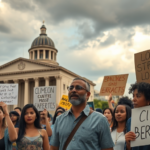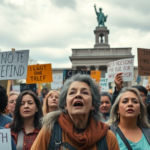DEI Under Threat: The Workforce Risks of Project 2025’s Policies
As the debate surrounding diversity, equity, and inclusion (DEI) takes center stage, recent efforts led by The Heritage Foundation to reshape federal policies have stirred significant concerns across the United States, including local communities served by Woke News. The initiative, known as Project 2025, proposes the dismantling of DEI programs within federal agencies, arguing that these practices are ideologically motivated and counterproductive. Additionally, it aims to influence the private sector by encouraging the Department of Justice to target companies that engage in DEI efforts under allegations of discrimination against white individuals.
The Controversy Behind Project 2025
Project 2025 has sparked widespread debate due to its sweeping proposals to eliminate DEI initiatives in federal agencies. These programs have historically played a vital role in reducing unemployment and enhancing equity for underrepresented groups and white men alike over the past decade. Local community leaders and organizations are questioning the anti-DEI movement’s motives, especially given that data has shown DEI initiatives to be beneficial across diverse demographics.
In an exclusive interview with Woke News, Dr. Janet Moreno, a diversity strategist from a local non-profit, expressed her concerns, “Dismantling DEI efforts could reverse critical progress in workforce diversity and inclusivity. Our studies have consistently shown that these programs not only lower unemployment but contribute to an equitable workplace environment that is crucial for productivity and innovation.”
Impact on Local Workforce
Communities and local businesses fear that rolling back DEI initiatives could have dire consequences on workforce diversity and inclusivity. Diverse teams have been proven to enhance creativity and problem-solving, elements crucial to maintaining the global competitiveness of American companies. The potential reduction in diversity brought about by Project 2025’s policies could lead to not only decreased innovation but also increased attrition and lower employee morale.
Timothy Rogers, a local business owner, weighed in during a recent town hall, stating, “We have seen firsthand how diverse teams can outperform homogenous ones by bringing unique perspectives to the table. If these DEI initiatives are undermined, my company’s ability to compete and innovate could be severely restricted.”
Corporate America’s Mixed Reactions
Some corporations have already started scaling back DEI efforts, bowing under legal and political pressures. This retreat poses reputational and legal risks, especially in an era where consumers and investors are progressively socially conscious. Companies failing to uphold their commitment to diversity may face backlash, affecting their business operations and profitability.
Despite these challenges, businesses are expected to navigate this changing landscape by balancing compliance with new policies while maintaining their commitments to DEI where possible. Martina Sanchez, an HR director from a leading tech firm in the area, asserts, “Our commitment to DEI extends beyond regulation. We are seeking creative strategies to maintain our initiatives, even if it means redefining them within broader corporate social responsibilities.”
Potential Consequences and Community Implications
Should Project 2025’s proposals come into full effect, the consequences for communities could be profound. The rollback of DEI initiatives may halt employment gains for minorities and propagate economic disparities. The Rio Grande Valley, known for its diverse population, could face heightened economic challenges, leading to increased unemployment among underrepresented groups.
An increase in economic disparities may also exacerbate social tensions and adversely affect public health by elevating stress and mental health concerns within these communities. Stakeholders are urged to remain vigilant and advocate for DEI’s undeniable benefits, ensuring that progress toward equality and justice continues unabated.
Path Forward
As Project 2025 progresses through political channels, it remains essential for policymakers, business leaders, and local communities to engage in transparent public discourse. Stakeholders must be prepared to articulate the measurable advantages of DEI initiatives, shifting the conversation from qualitative benefits to quantitative impacts on corporate sustainability and social equity.
Advocacy groups, backed by empirical evidence, should strive to influence policymakers and corporate leaders, showcasing how DEI initiatives drive employee satisfaction and enhance overall organizational performance. By fostering an inclusive society, stakeholders can work together to cultivate a future where diversity and equity serve as foundations for community resilience and prosperity.
To equip residents better and provide support, Woke News will continue to follow this story and offer updates. Residents interested in learning more about how these changes could impact their lives are encouraged to participate in upcoming community forums or contact local advocacy groups for advice and information. As we move forward, enduring commitment to diversity, equity, and inclusion remains vital in shaping the workforce of tomorrow.







